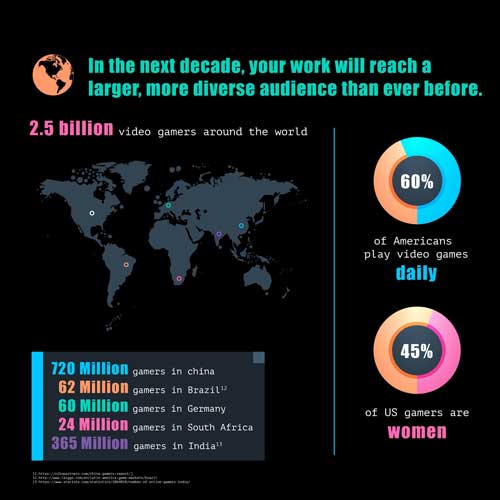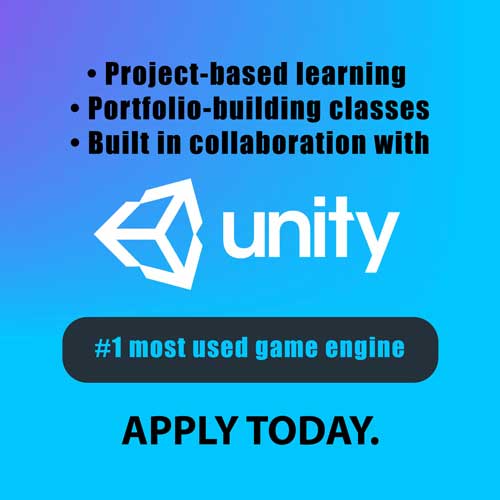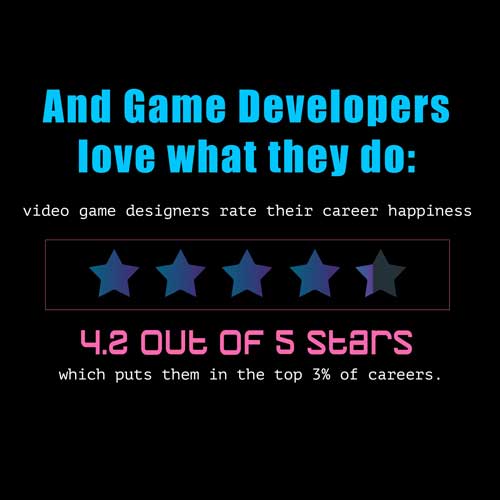Computer Science with Game Development
As a part of the Computer Science degree, the Game Development program is intended to prepare students for a role in Game Development, with specific expertise in working with the Unity Engine. OKWU’s Game Development program was developed with significant input from Unity, the IGDA, and multiple studio heads to provide students with the best possible chance of capitalizing on the growth of Unity development roles.
This program will prepare students to perform well in a variety of roles within the gaming industry. According to ZipRecruiter, the median salary for a game developer is slightly over $100,000. Entry level salaries often start around $60,000 with significant room for growth.

Developed with Unity
The Game Development program is intended to prepare students for a role in Game Development, with specific expertise in working with the Unity Engine. Unity powers more than 70% of mobile games worldwide.

Median Salary of $109,000+
According to the US Bureau of Labor Statistics, software/game developers had a median salary of $109,020 in 2021 and the number of jobs is expected to grow by 25% per year this decade.

Hybrid Learning Options
Specialty courses in this program are available in synchronous or asynchronous options, allowing for more flexible class schedules while still on campus.

Career Path
The number of jobs open nationally for video game designers has a bright outlook is expected to grow at more than 3x the national average rate through 2028. Entry-level positions, such as Game Designer, earn average salaries in excess of $78,000 annually. Beyond the entry level, some of the job titles in this career pathway are:
- Computer Scientist – National Average Salary: $111,393
- Software Developer– National Average Salary: $120,730
- Web Administrator – National Average Salary: $95,270
- Network Architect – National Average Salary: $125,149
- Software Engineer – National Average Salary: $93,846
- Web Developer – National Average Salary: $67,787
Earn Your Game Development Degree
- Faculty with real-world experience
- Transfer credit accepted
- Accredited by the HLC
- Use design, program, and collaboration skills to develop games.
- Critically analyze and evaluate games as well as their themes,
- Appreciate games as an artistic medium and a technology product.



Why Game Development Matters
Our Game Development major is intended to provide students with the skills they need to successfully work in the games industry as a programmer, designer, or producer. It deliberately focuses on providing students with a broad base of experience, in order to allow them to find success either at larger firms or with smaller developers: the latter of which is of tremendous contemporary relevance, as the majority of new jobs in game development are at small-to-medium sized studios.
The Unity Engine is central to this program. Students will complete 15 credit hours of work in Unity, learning key principles of game design, systems design, and ultimately building their own fully functioning game as part of their capstone project. Along the way, they will learn to program in Python, C#, Javascript, HTML5, and CSS3 – all incredibly valuable languages in both the games industry and the larger technology space. Students will also build strong skills in application development, user experience design, web design and project management allowing them to pursue other careers in technology should they choose to do so.
Program Contributors
In partnership with Rize Education, our curriculum was developed by Dr. Charles Severance of the University of Michigan in partnership with Fereshteh Forough, CEO of Code To Inspire; Renee Gittins, Executive Director of the International Game Development Association (IGDA); and Thomas O’Connor, Studio Director for PlayEveryWare. Our corporate partner is Unity – the world’s most-used game engine.
How does this degree align with the real world?
Upon completion of their degree program, students will possess the necessary skills to obtain the Unity Certified Associate: Programmer certification, a highly desirable entry level professional credential. Additionally, students will have completed the bulk of the requirements and learning objectives required for the Unity Certified Associate: Game Developer exam, with many students who take advantage of opportunities such as game jams and internships being fully prepared.
Taught by Industry Experts
OKWU has partnered with a consortium of colleges and universities to be able to bring this degree to campus. Several of the technical courses in this degree will be taught online by professors from one of our partner universities.


Featured Core Classes
Content & Systems Design
If you’ve ever enjoyed the experience of playing a video game, you’ve had a first-hand lesson in how important content and systems design are. The experience of a game is driven by four major components: content, systems, narrative, and user experience. This class will help you learn to design all four components, and build a deeper understanding of the game development process and an introduction to concepts in scripting.
Working with Unity
This course, built in collaboration with Unity and the IGDA, will introduce you to developing games in Unity. By the end of this course, you’ll learn how to build a fully functioning game within the Unity system, including all key elements.
Capstone Project
This course is intended as a culmination of all a student’s work in Game Development. Students will work in groups to build a game in the unity engine that uses real-time 2D or 3D visuals and showcases their understanding of the core principles of game design. Students will pitch their game, design, prototype, build and test their game. Students will be evaluated based on the quality of their game, and their internal project management processes.
Explore OKWU
A Premier Christian University in Northeast Oklahoma